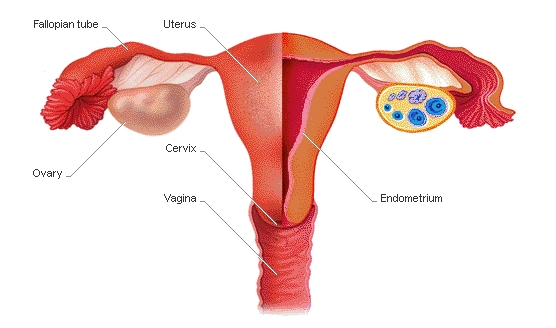Endometriosis is a common disorder that affects women during their reproductive years. It occurs when endometrial tissue, which lines the uterus, grows outside the uterine cavity. This misplaced tissue may implant and grow anywhere within the abdominal cavity, or rarely in distant sites such as the naval or lungs. This tissue may grow in small, superficial patches called implants, in thicker, penetrating nodules, or it may form cysts in the ovary called endometriomas.
Endometriosis is a disease affecting millions of women throughout the world. For many, the condition goes unnoticed. But for others, it demands professional attention, especially when fertility is impaired or pain affects the lifestyle. Endometriosis is highly unpredictable. Some women may have a few isolated implants that never spread or grow, while in others, the disease may spread throughout the pelvis. Many women who have endometriosis experience few or no symptoms.
There are many different symptoms that may present themselves to women who have endometriosis including painful menstrual cramps, pain during intercourse, abnormal uterine bleeding, and/or infertility. Endometriosis may hinder conception in various ways. Endometriosis in the pelvis, for example, may inflame surrounding tissue and spur the growth of scar tissue or adhesions. Bands of scar tissue may bind the ovaries, fallopian tubes, and intestines together. Adhesions may interfere with the release of eggs from the ovaries or the pick-up of the egg by the fallopian tubes. If the ovaries are pulled away from the tubes, eggs may fail to enter the tubes on a regular basis after ovulation.
The diagnosis of endometriosis cannot be made from symptoms alone. Your physician may suspect the disease if you are having fertility problems, severe menstrual cramps, or pain during intercourse. Remember, however, that many patients with the condition report no symptoms at all. Endometriosis can usually be treated by medication or surgery designed to preserve fertility. Fortunately for most patients, these treatments help to counteract the effects of endometriosis.
Many specialists believe that endometriosis is more likely to be found in women who have never been pregnant. For this reason, the condition is sometimes labeled as a “career women’s disease” because working women often delay pregnancy. But endometriosis cannot be so easily generalized. Sometimes it affects women who have had children, and it can also occur in teenagers.
Women with endometriosis who have few or no symptoms may require no treatment. Endometriosis can also be treated with hormone medication, oral contraceptives, danazol, GnRH analogs, progestins and surgery.
Written by: The Fertility Center




